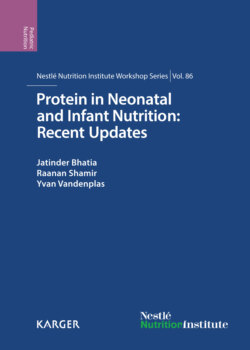Читать книгу Protein in Neonatal and Infant Nutrition: Recent Updates - Группа авторов - Страница 14
На сайте Литреса книга снята с продажи.
Protein Needs in Infancy
ОглавлениеCurrent research is dedicated to understand the role and importance of nutrition in early postnatal life on health in later life. Optimal patterns of infant feeding are important first to support healthy growth and development in infancy but also as determinants of health in later life. It is known that inadequate nutrition and retardation of growth in infancy can result in permanent stunting as well as potentially long-lasting deficits in neurological function or metabolic health for example [1, 2].
The infant’s first year of life is a critical time of rapid growth and development. Growth and development between birth and weaning are crucial for long-term well-being. The rapid growth of the baby (the body weight of a baby doubles by 6 months) must be supported by a high rate of protein synthesis. The rate of protein synthesis and turnover are then exceptionally high in infants relative to their body weight. In the first month of life, they need around 3.5 times as much protein per kilogram of body weight as an adult. Although growth velocity, and thereby protein requirements, rapidly declines during the first 3 months of life, at the age of 4-6 months, infants still need more than 60%, and at 6-12 years around 40% more protein than adults per kilogram of body weight.
Requirements for proteins are expressed in terms of total proteins and individual amino acids, meaning that both the quantity and the quality of proteins supplied are important.
